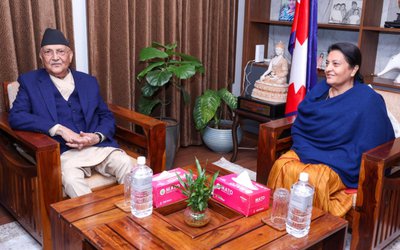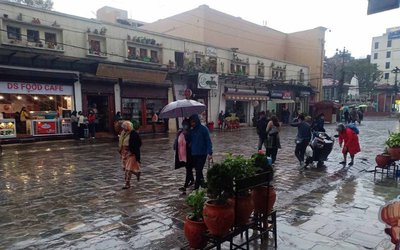
“Initially, I always think for myself what is open defection, the open defection. I feel, don’t we Nepalis do it? After learning, reading and understanding, I come to know that this is like a big university,” writes Ashutosh Tiwari, country representative of WaterAid-Nepal in his Facebook wall. “In Nepal it is interesting to discuss on big development issues. Now-a-day, I come to realize that only after completing the small scale development, we can go for big development.”
Tiwari’s comments seem simple but they have a lot of meaning. Known as touristic heaven, even the villages like Nagarkot have problems related to open defection. What might the other rural villages have in store?
Tiwari’s reaction appeared just a day before declaring Nagarkot village development committee, 20 kilometers east of capital, as an Open Defection Free Zone in Bhaktpur. Out of total 16 village development committees, Nagarkot is the sixth village in Bhaktapur to declare this.
As other people think, making certain areas open defection free zones is not easy as it involves many things.
“It includes economics, finance, public policy, sociology, engineering, public health, marketing, anthropology, philosophy, development studies, political science, statistics, journalism, public administration. After meeting with Kathmandu University Mechanical Engineering students, I come to know that there is also computer coding for sanitation apps,” said Tiwari.
In a country like Nepal, that is constantly trying to boost its tourist population, the environment must be appealing. From dust to the litter to open defecation, the environment seems uninviting.
Organizations, like the Village Development Committees (VDCs) are taking the initiative to create a change. The most recent effort in developing a cleaner environment was taken by the Nagarkot VDC on the 5th of July 2013, whenthey declared Nagarkot to be an open defecation free zone.
In March of 2013, 249 households out of 825 households did not have any toilets. All of the 249 households that did not have toilets excreted on the streets.
Fast-forward four months, there are 249 toilets and 3 public latrines in the area. The latrines are located in the Home stay area, the tourism development board, and the health post. Students also have access to these latrines. There is an additional latrine being planned at the bus park. The streets are cleaner, and the environment is safer.
Wateraid-HSBC Water Program helped create an awareness of the harm caused by emitting outdoors. The Village Water and the Sanitation Coordination Committee executed the testimony. The NGO, Environment and Public Health Organization (ENPHO) assisted.
Open defection leads to a polluted, at times, hazardous environment. The nature degrades, and creates public health threats. By the 21st of October 2013, 10 VDCs are to be declared so.
The total number of VDC members is 4429, of which 2254 are women and 2275 are men. 842 out of 3915, which is 11%, have already been declared free of external excretion.
Rajeshwori Sharma Lamsal, District Public Health Office and Health Post in charge said, “We used [to have] a lot of cases of water borne diseases: Amoebic Dysentery, Diarrhea, Typhoid, Jaundice, and Cholera being the major ones. However, since the past few months these cases have decreased.” By setting up toilets in rural areas, open defecation will decrease, and in time, won’t exist. This will cause a reduction in illnesses and sanitary health ailments.”

Aryaa Rajouria
Rajouria is an intern.
- Biratnagar: Business Capital
- Aug 08, 2013
- Our Street Animals
- Jul 26, 2013
- NO OPEN DEFECTION: Nagarkot Now
- Jul 14, 2013
- EDUCATION : Growing Disparity
- Jun 29, 2013
- Leprosy: Down, Not Out
- Jun 16, 2013














